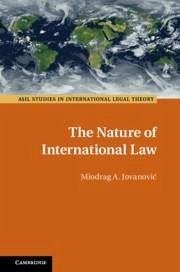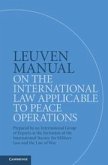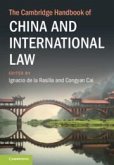Miodrag A Jovanovic
The Nature of International Law
Miodrag A Jovanovic
The Nature of International Law
- Gebundenes Buch
- Merkliste
- Auf die Merkliste
- Bewerten Bewerten
- Teilen
- Produkt teilen
- Produkterinnerung
- Produkterinnerung
The Nature of International Law provides a comprehensive analytical account of international law within the prototype theory of concepts.
Andere Kunden interessierten sich auch für
![The Juridical Nature of Unilateral Acts of States in International Law The Juridical Nature of Unilateral Acts of States in International Law]() Eva KassotiThe Juridical Nature of Unilateral Acts of States in International Law216,99 €
Eva KassotiThe Juridical Nature of Unilateral Acts of States in International Law216,99 €![The Doctrine of Odious Debt in International Law The Doctrine of Odious Debt in International Law]() Jeff KingThe Doctrine of Odious Debt in International Law109,99 €
Jeff KingThe Doctrine of Odious Debt in International Law109,99 €![Leuven Manual on the International Law Applicable to Peace Operations Leuven Manual on the International Law Applicable to Peace Operations]() Leuven Manual on the International Law Applicable to Peace Operations177,99 €
Leuven Manual on the International Law Applicable to Peace Operations177,99 €![The Cambridge Handbook of China and International Law The Cambridge Handbook of China and International Law]() The Cambridge Handbook of China and International Law224,99 €
The Cambridge Handbook of China and International Law224,99 €![The Public International Law of Trade in Legal Services The Public International Law of Trade in Legal Services]() David CollinsThe Public International Law of Trade in Legal Services149,99 €
David CollinsThe Public International Law of Trade in Legal Services149,99 €![The World Crisis and International Law The World Crisis and International Law]() Paul B StephanThe World Crisis and International Law99,99 €
Paul B StephanThe World Crisis and International Law99,99 €![International Law and the Arctic International Law and the Arctic]() Michael ByersInternational Law and the Arctic142,99 €
Michael ByersInternational Law and the Arctic142,99 €-
-
-
The Nature of International Law provides a comprehensive analytical account of international law within the prototype theory of concepts.
Hinweis: Dieser Artikel kann nur an eine deutsche Lieferadresse ausgeliefert werden.
Hinweis: Dieser Artikel kann nur an eine deutsche Lieferadresse ausgeliefert werden.
Produktdetails
- Produktdetails
- Verlag: Cambridge University Press
- Seitenzahl: 284
- Erscheinungstermin: 13. Juni 2019
- Englisch
- Abmessung: 234mm x 216mm x 18mm
- Gewicht: 544g
- ISBN-13: 9781108473330
- ISBN-10: 1108473334
- Artikelnr.: 54469709
- Herstellerkennzeichnung
- Libri GmbH
- Europaallee 1
- 36244 Bad Hersfeld
- gpsr@libri.de
- Verlag: Cambridge University Press
- Seitenzahl: 284
- Erscheinungstermin: 13. Juni 2019
- Englisch
- Abmessung: 234mm x 216mm x 18mm
- Gewicht: 544g
- ISBN-13: 9781108473330
- ISBN-10: 1108473334
- Artikelnr.: 54469709
- Herstellerkennzeichnung
- Libri GmbH
- Europaallee 1
- 36244 Bad Hersfeld
- gpsr@libri.de
Miodrag A. Jovanovi¿ is a Full Professor in Jurisprudence in the Faculty of Law at the University of Belgrade. His areas of interest are jurisprudence, philosophy of international law, legal theory of collective rights, political theory of multiculturalism, federalism and legal and political nature of the EU. He is a fellow of the Alexander von Humboldt Foundation and the 2016 Brandon Fellow of the Lauterpacht Centre for International Law, University of Cambridge. He has previously published Collective Rights: A Legal Theory (Cambridge, 2012).
Acknowledgments; Introduction; Part I. International Law as a Subject
Matter of Legal Philosophy - A Brief Historical Overview: 1. Early
theorizing about law beyond the state - Ancient Greece and Rome; 2. Natural
law theory and the birth of international legal scholarship - Grotius,
Pufendorf and Hobbes; 3. The German public law turn; 4. Classical
analytical jurisprudence: the rise of skepticism towards international law;
5. Twentieth century legal positivism on international law; 6. Revived
jurisprudential interest in international law; Part II. In Search of the
Nature of (International) Law - Methodological Postulates: 7. Grasping
'analytical' in the analytical approach; 8. Challenges to the conceptual
analysis; 9. Beyond the conceptual analysis? The prototype theory of
concepts and the nature of law; Part III. Typical Features of
(International) Law: 10. The central case of law (as a genre); 11. Typical
features of (international) law - preliminary finding; Part IV.
International Law as a Normative Order: 12. Epistemological perspective -
how are we to ascertain a norm; 13. Epistemological perspective at the
international level - on formal sources of international law; 14.
Perspective of practical rationality - how norms provide reasons for
action; 15. Perspective of practical rationality at the international
level; Part V. International Law as an Institutionalized and (Coercively)
Guaranteed Order: 16. Institutionalization of the international order; 17.
Institutions of international law; 18. (Coercive) guarantees in
international law; Part VI. Justice-Aptness of International Law: 19.
Allocative conflicts and international law-making; 20. Rectificatory
justice and international law-application; Part VII. Fragmentation - A
Special Feature of International Law?: 21. Hart's lens of 'systematicity';
22. The ILC's lens of 'fragmentation'; 23. The 'as if' lens of
international law's unity; In lieu of a conclusion - a note on
(un)certainty.
Matter of Legal Philosophy - A Brief Historical Overview: 1. Early
theorizing about law beyond the state - Ancient Greece and Rome; 2. Natural
law theory and the birth of international legal scholarship - Grotius,
Pufendorf and Hobbes; 3. The German public law turn; 4. Classical
analytical jurisprudence: the rise of skepticism towards international law;
5. Twentieth century legal positivism on international law; 6. Revived
jurisprudential interest in international law; Part II. In Search of the
Nature of (International) Law - Methodological Postulates: 7. Grasping
'analytical' in the analytical approach; 8. Challenges to the conceptual
analysis; 9. Beyond the conceptual analysis? The prototype theory of
concepts and the nature of law; Part III. Typical Features of
(International) Law: 10. The central case of law (as a genre); 11. Typical
features of (international) law - preliminary finding; Part IV.
International Law as a Normative Order: 12. Epistemological perspective -
how are we to ascertain a norm; 13. Epistemological perspective at the
international level - on formal sources of international law; 14.
Perspective of practical rationality - how norms provide reasons for
action; 15. Perspective of practical rationality at the international
level; Part V. International Law as an Institutionalized and (Coercively)
Guaranteed Order: 16. Institutionalization of the international order; 17.
Institutions of international law; 18. (Coercive) guarantees in
international law; Part VI. Justice-Aptness of International Law: 19.
Allocative conflicts and international law-making; 20. Rectificatory
justice and international law-application; Part VII. Fragmentation - A
Special Feature of International Law?: 21. Hart's lens of 'systematicity';
22. The ILC's lens of 'fragmentation'; 23. The 'as if' lens of
international law's unity; In lieu of a conclusion - a note on
(un)certainty.
Acknowledgments; Introduction; Part I. International Law as a Subject
Matter of Legal Philosophy - A Brief Historical Overview: 1. Early
theorizing about law beyond the state - Ancient Greece and Rome; 2. Natural
law theory and the birth of international legal scholarship - Grotius,
Pufendorf and Hobbes; 3. The German public law turn; 4. Classical
analytical jurisprudence: the rise of skepticism towards international law;
5. Twentieth century legal positivism on international law; 6. Revived
jurisprudential interest in international law; Part II. In Search of the
Nature of (International) Law - Methodological Postulates: 7. Grasping
'analytical' in the analytical approach; 8. Challenges to the conceptual
analysis; 9. Beyond the conceptual analysis? The prototype theory of
concepts and the nature of law; Part III. Typical Features of
(International) Law: 10. The central case of law (as a genre); 11. Typical
features of (international) law - preliminary finding; Part IV.
International Law as a Normative Order: 12. Epistemological perspective -
how are we to ascertain a norm; 13. Epistemological perspective at the
international level - on formal sources of international law; 14.
Perspective of practical rationality - how norms provide reasons for
action; 15. Perspective of practical rationality at the international
level; Part V. International Law as an Institutionalized and (Coercively)
Guaranteed Order: 16. Institutionalization of the international order; 17.
Institutions of international law; 18. (Coercive) guarantees in
international law; Part VI. Justice-Aptness of International Law: 19.
Allocative conflicts and international law-making; 20. Rectificatory
justice and international law-application; Part VII. Fragmentation - A
Special Feature of International Law?: 21. Hart's lens of 'systematicity';
22. The ILC's lens of 'fragmentation'; 23. The 'as if' lens of
international law's unity; In lieu of a conclusion - a note on
(un)certainty.
Matter of Legal Philosophy - A Brief Historical Overview: 1. Early
theorizing about law beyond the state - Ancient Greece and Rome; 2. Natural
law theory and the birth of international legal scholarship - Grotius,
Pufendorf and Hobbes; 3. The German public law turn; 4. Classical
analytical jurisprudence: the rise of skepticism towards international law;
5. Twentieth century legal positivism on international law; 6. Revived
jurisprudential interest in international law; Part II. In Search of the
Nature of (International) Law - Methodological Postulates: 7. Grasping
'analytical' in the analytical approach; 8. Challenges to the conceptual
analysis; 9. Beyond the conceptual analysis? The prototype theory of
concepts and the nature of law; Part III. Typical Features of
(International) Law: 10. The central case of law (as a genre); 11. Typical
features of (international) law - preliminary finding; Part IV.
International Law as a Normative Order: 12. Epistemological perspective -
how are we to ascertain a norm; 13. Epistemological perspective at the
international level - on formal sources of international law; 14.
Perspective of practical rationality - how norms provide reasons for
action; 15. Perspective of practical rationality at the international
level; Part V. International Law as an Institutionalized and (Coercively)
Guaranteed Order: 16. Institutionalization of the international order; 17.
Institutions of international law; 18. (Coercive) guarantees in
international law; Part VI. Justice-Aptness of International Law: 19.
Allocative conflicts and international law-making; 20. Rectificatory
justice and international law-application; Part VII. Fragmentation - A
Special Feature of International Law?: 21. Hart's lens of 'systematicity';
22. The ILC's lens of 'fragmentation'; 23. The 'as if' lens of
international law's unity; In lieu of a conclusion - a note on
(un)certainty.








